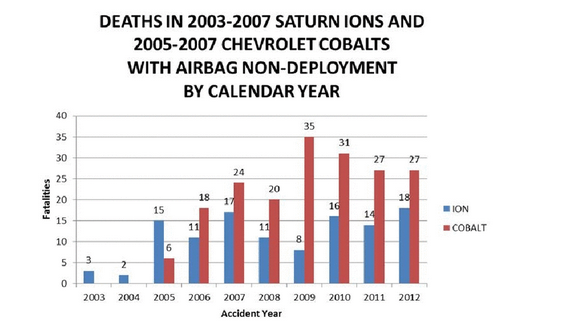Review Claims GM Defect May Be Tied To Up To 303 Deaths

Center for Auto Safety research claims that 303 people have died while sitting in the front seat of Saturn Ion or Chevy Cobalt vehicles in which the airbags failed to deploy.
One of the biggest concerns about the ignition defect is that heavy keychains and jarring interactions — like driving through a pothole — can cause the car’s ignition switch to turn off, meaning the airbags will not deploy if the vehicle is involved in a crash.
The Center for Auto Safety, a D.C.-based watchdog group, commissioned a review of crash data involving airbag failures from 2003 through 2012. According to the info for crashes involving Saturn Ion and Chevy Cobalt vehicles, 303 people died in such accidents during that period of time.
This is not simply everyone who died in a crash involving these two GM models. The 303 figure, says CAS, is the number of people killed while sitting in the front seats of Cobalts or Ions as a result of a non-rear-impact crash in which the airbags didn’t deploy. In total, the 303 deaths represent about 26% of the 1,148 fatalities in these car models during the years in question.
So while it can’t be said for sure that these people would have survived had the airbags deployed — and it’s possible that all 303 deaths would have taken place even with the airbags — these are instances in which airbags most likely should have deployed. The airbag failures, while a possible indicator of an ignition failure, are also not necessarily proof that the ignition defect was involved in any particular incident.
GM has been criticized for knowing about a possible ignition switch defect as far back as 2001, before the first affected vehicles even went into full production. Meanwhile, NHTSA is having to answer questions about why it failed to push for a recall even after it opened three different investigations into crashes involving ignition-related issues in these cars.
Speaking to lawmakers yesterday, Acting NHTSA Administrator David Friedman said the agency had not received “timely information” from GM and that the data it did gather over the years “was inconclusive” and “just didn’t point to a formal investigation.”
In a letter to Friedman, CAS Executive Director Clarence Ditlow takes issue with such claims.
“NHTSA claims it did not do an investigation because it did not see a defect trend,” writes Ditlow, pointing to the results of his group’s review of the crash dataa. “In some instances, single complaints can trigger a recall.”
GM says that the review’s use of raw data to jump to conclusions about the number of deaths is misleading.
“Without rigorous analysis, it is pure speculation to attempt to draw any meaningful conclusions,” a rep for the automaker tells the NY Times.
The President of Safety Research and Strategies isn’t as dismissive of the report.
“This is certainly a place from which to start looking at crashes to see what might be directly related to the ignition switch,” he tells the L.A. Times. “We need further analysis to see how many of these are related directly to an ignition issue.”
303 Deaths Seen in G.M. Cars With Failed Air Bags [NY Times]
As many as 303 deaths linked to faulty ignition switches in recalled GM cars [L.A. Times]
Want more consumer news? Visit our parent organization, Consumer Reports, for the latest on scams, recalls, and other consumer issues.

